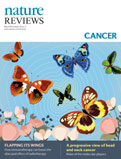Advertisement |
 |
EXPLORE HUMANIZED MICE IN PRECLINICAL IMMUNO-ONCOLOGY
Discover the strengths and limitations of human immune system-engrafted mice and understand how choosing the right model is critical to effective preclinical immuno-oncology efforts.
Learn How To: - Leverage foundational humanized immune system models
- Evaluate humanized models used in combinatorial treatment strategies
Watch this Webinar |  | |
 |
 |
TABLE OF CONTENTS
|
| May 2018 Volume 18, Issue 5 |
 |  |  |
 |  Research Highlights Research Highlights
 Reviews Reviews
 Perspectives Perspectives
|  | Advertisement |  |  |  | 
Do you have a career question?
The Naturejobs podcast features one-on-one Q&As, panel discussions and other exclusive content to help scientists with their careers. Hosted on the Naturejobs blog, the podcast is also available on iTunes and Soundcloud.
Listen today! | |
| |
Advertisement |
 |
Gain Insights into Cancer Research
Metabolic reprogramming is a critical area of research and potential therapeutic strategy for cutaneous squamous cell carcinoma. Learn how the new, quantitative Agilent Seahorse XF Glycolytic Rate Assay can be used for cancer drug screening and to reveal mechanisms of action.
Watch the webinar to learn more. |  | |
 |
| |
| Advertisement |
 |
| |
 |
| |
Research Highlights | |
 |
| |
Reviews | |
 |
 |
 |
| The molecular landscape of head and neck cancer pp269 - 282
C. René Leemans, Peter J. F. Snijders & Ruud H. Brakenhoff
doi:10.1038/nrc.2018.11
Head and neck cancer is an unexpectedly heterogeneous disease. In this Review, Leemans, Snijders and Brakenhoff provide an update on the molecular biology of head and neck cancer, outline the role of human papillomavirus and discuss the functional role of genes involved in malignant progression to identify subgroups to personalize treatment. |
 |
 |
 |
| Gut microbiota injury in allogeneic haematopoietic stem cell transplantation pp283 - 295
Yusuke Shono & Marcel R. M. van den Brink
doi:10.1038/nrc.2018.10
Allogeneic haematopoietic stem cell transplantation (allo-HSCT) is a well-established treatment for many haematopoietic malignancies but often results in life-threatening complications, such as graft-versus-host disease, relapse and infections. This Review discusses the potential role of intestinal microbiota in complications after allo-HSCT. |
 |
 |
 |
| Cell motility in cancer invasion and metastasis: insights from simple model organisms pp296 - 312
Christina H. Stuelten, Carole A. Parent & Denise J. Montell
doi:10.1038/nrc.2018.15
In this Review, Stuelten et al. outline insights with relevance to human cancer invasion and metastasis that have come from the study of cell motility in non-mammalian model organisms. |
 |
| Advertisement |
 |
| |
 |
| |
Perspectives | |
 |
 |
| Opinions |
 |
 |
 |
| Using immunotherapy to boost the abscopal effect pp313 - 322
Wilfred Ngwa, Omoruyi Credit Irabor, Jonathan D. Schoenfeld, Jürgen Hesser, Sandra Demaria et al.
doi:10.1038/nrc.2018.6
The abscopal effect, which is the regression of metastatic cancer at distant sites during radiotherapy, is somewhat rare but can be promoted by immunotherapy. This Opinion article describes emerging concepts and limitations of using a combination of radiotherapy and immunotherapy to boost the abscopal effect. |
 |
 |
 |
| Non-angiogenic tumours and their influence on cancer biology pp323 - 336
Tom Donnem, Andrew R. Reynolds, Elizabeth A. Kuczynski, Kevin Gatter, Peter B. Vermeulen et al.
doi:10.1038/nrc.2018.14
In this Opinion article, Donnem et al. outline the evidence for non-angiogenic tumours, which use pre-existing blood vessels to support tumour growth, and discuss the studies that are beginning to define their unique biology. |
 |
 |
 |
 |  |  |  |  |  | Natureevents is a fully searchable, multi-disciplinary database designed to maximise exposure for events organisers. The contents of the Natureevents Directory are now live. The digital version is available here.
Find the latest scientific conferences, courses, meetings and symposia on natureevents.com. For event advertising opportunities across the Nature Publishing Group portfolio please contact natureevents@nature.com |  |  |  |  |  | |
 |


No comments:
Post a Comment